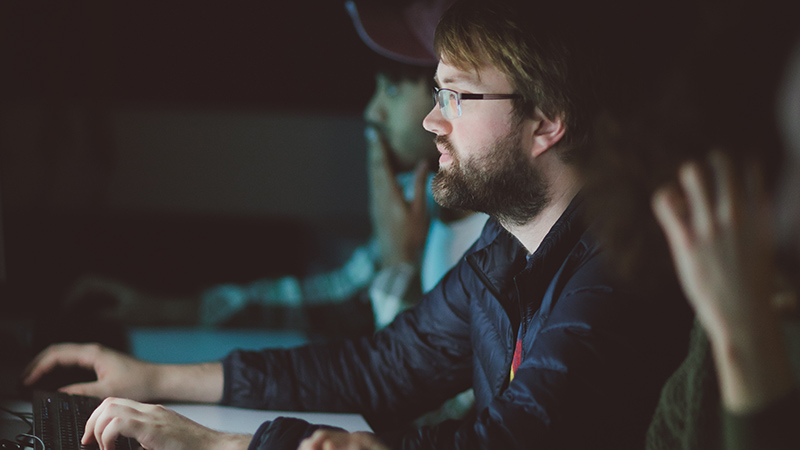Computing Science
MSc or PGDip or PGCert
Start dates: September 2026
Full time: MSc - 1 year (12 months); PG Dip - 6 months; PG Cert - 3 months
Part time: MSc - 2 years (24 months); PG Dip - 18 months (12 months study time); PG Cert - 6 months
Location: Headington
Overview
We live in a digital world. We need people like you with specialist technical skills to develop and maintain systems, software, and networks. Computing Science at Oxford Brookes is packed with real-world projects and industry-relevant experience to help you work towards a career in any computing related area.
Programming. Hardware. Software. Networks. You’ll develop specialist skills and expert-level knowledge in a range of IT areas. You’ll be surrounded by experienced professionals and top researchers in subjects ranging from computer vision to system design.
No matter what you studied at undergraduate level, we’ll help you develop your computing skills to a professional standard. Perhaps you’re in a technical industry but want to specialise more on the IT side? Or you’re in a different sector and fancy a career change? If you’ve got a scientific mindset and good work ethic, we’ll help you open up those new opportunities.

Why Oxford Brookes University?
-
Develop technical skills
Learn programming, software engineering, data organisation, and network design and build a solid foundation for a wide range of technical careers.
-
Original and inspiring research
We’re home to top researchers in areas ranging from digital forensics to computer vision. You can get involved in some of our work, including the Artificial Intelligence and Robotics Group.
-
Accredited by BCS
The chartered institute for IT has given this course their approval, meaning you’ll get a good grounding in the professional issues relevant to a career in IT.
-
New State-of-the-art facilities
All Computing courses are based in new, custom designed buildings at our main Headington site. You'll benefit from state-of-the-art facilities and equipment including a VR cave, digital, computing and robotics labs, as well as social learning spaces, teaching rooms and cafe space.
Course details
Study modules
The modules listed below are for the master's award. For the PGDip and PGCert awards your module choices may be different. Please contact us for more details.
Please note: As our courses are reviewed regularly as part of our quality assurance framework, the modules you can choose from may vary from those shown here. The structure of the course may also mean some modules are not available to you.
Research
The School of Engineering, Computing and Mathematics is home to world-leading and award-winning research.
Our focus is on user-inspired original research with real-world applications. We have a wide range of activities from model-driven system design and empirical software engineering through to web technologies, cloud computing and big data, digital forensics and computer vision.
Staff and students collaborate on projects supported by the EPSRC, the EU, the DTI, and several major UK companies.
Computing achieved an excellent assessment of its UoA (Unit of Assessment) 11 return for REF 2014 (Research Excellence Framework).
You can be involved with research in the following research groups:
Careers
Computing science is a practical and useful degree that could help you develop your career in almost any industry. Our graduates typically go on to become:
- developers
- engineers
- IT managers
- web developers.
They’re working at organisations of all shapes and sizes, from small startups to the NHS and the public sector. Some also decide to use their technical expertise as a basis for PhD study, perhaps thinking of a career in scientific research.
Entry requirements
Specific entry requirements
To join this course you'll need a 2:2 UK bachelor's degree, in a non-computing subject. If your degree contains only a small element of technical computing you can also be considered.
For entry to the Postgraduate Certificate Research Project you should provide evidence of experience in research and study methods at an appropriate level.
Please also see the University's general entry requirements.
English language requirements
If your first language is not English you will require a minimum IELTS score of 6.0 overall with 6.0 in all components.
OR
An equivalent English language qualification acceptable to the University.
Please also see the University's standard English language requirements.
Pathways courses for international and EU students
We offer a range of courses to help you meet the entry requirements for your postgraduate course and also familiarise you with university life in the UK.
Take a Pre-Master's course to develop your subject knowledge, study skills and academic language level in preparation for your master's course.
If you need to improve your English language, we offer pre-sessional English language courses to help you meet the English language requirements of your chosen master’s course.
English requirements for visas
If you need a student visa to enter the UK you will need to meet the UK Visas and Immigration minimum language requirements as well as the University's requirements. Find out more about English language requirements.
Terms and conditions of enrolment
When you accept our offer, you agree to the Terms and Conditions of Enrolment. You should therefore read those conditions before accepting the offer.
International qualifications and equivalences
How to apply
Application process
Tuition fees
Questions about fees?
Contact Student Finance on:
Tuition fees
The following factors will be taken into account by the University when it is setting the annual fees: inflationary measures such as the retail price indices, projected increases in University costs, changes in the level of funding received from Government sources, admissions statistics and access considerations including the availability of student support.
How and when to pay
Tuition fee instalments for the semester are due by the Monday of week 1 of each semester. Students are not liable for full fees for that semester if they leave before week 4. If the leaving date is after week 4, full fees for the semester are payable.
- For information on payment methods please see our Make a Payment page.
- For information about refunds please visit our Refund policy page
Additional costs
Please be aware that some courses will involve some additional costs that are not covered by your fees. Specific additional costs for this course are detailed below.
Optional costs
| Additional costs | Amount (£) |
|---|---|
| Travel and associated costs if relevant when undertaking work placements. | £30-700 per year |
If you are considering bringing your own computer, most of the software we use is on Windows machines though there is some use of Linux. We do not use Apple MacOS and their use is not required but some students do choose to bring MacOS machines so a Mac can be a viable choice if you so wish.
|
£500-1200 |
It’s your responsibility to cover print / binding costs where coursework submission is required. Please note that a lot of the coursework is now submitted online. |
From £30 |
| You may choose to purchase books to support your studies. Many books on our reading lists are available via the Library, or can be purchased secondhand. | £20-60 per book |
Accommodation fees in Brookes Letting (most do not include bills) |
£107-301 per week |
Accommodation fees in university halls (bills included, excluding laundry costs) |
£139-248 per week |
Graduation costs include tickets, gowning and photography. Gowns are not compulsory but typically students do hire robes, starting at £41. |
Typically £0-200 |
Students are responsible for their own travel to and from university for classes. For the 2025/26 academic year, the University is introducing an alternative subsidised travel offer for all students with further information on our Travel webpages. |
From £10 |
Funding your studies
Financial support and scholarships
Featured funding opportunities available for this course.
All financial support and scholarships
Programme changes:
On rare occasions we may need to make changes to our course programmes after they have been
published on the website. For more information, please visit our
changes to programmes page.


